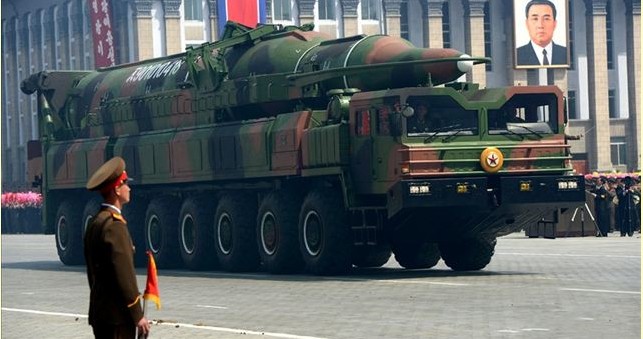Media Report

- Quartz reports: "Soon after North Korea sent another missile over Japan Friday morning (Sept. 15), US secretary of state Rex Tillerson called on China and Russia to take stronger action on their own against North Korea. When it comes to China, that might already be happening. Around the time the US was agreeing to leave a full oil embargo out of the latest sanctions on North Korea, viewed as a concession to China and Russia, news reports out of Beijing said that the biggest state banks had been ordered to stop opening new accounts for North Korean individuals and entities. The Chinese measures, reported by various publications including the Financial Times and South Korea's Daily NK news site, go further than current UN sanctions, which, while well short of what the US wanted, should see some reduction in the supply of energy products to North Korea. China's bottom-line position on North Korea is that it's not going to allow chaos on its doorstep, whether that's a brutal war or a refugee crisis... But, North Korea's frequent weapons tests, coinciding with big events in China, haven't helped the relationship any. Meanwhile the US is keeping the pressure up on China. For China, that means getting tougher on North Korea—but not overly tough."
- Reuters reports: "Chinese academics are publicly broaching the idea that China and the United States should share plans on how to deal with a potential conflict on the Korean Peninsula, a sign some say of how North Korea's weapons test may be making Beijing more open to the once taboo subject. Chinese officials have rebuffed top U.S. military brass for years in their efforts to share contingencies for war or regime collapse in Pyongyang, suspicious over Washington's intentions and fearful that such engagement could further alienate North Korea, their once steadfast wartime ally. Jia Qingguo, the dean of the School of International Studies at China's elite Peking University and a respected advisor to Chinese leaders, said in an article this week that with the chances of war increasing daily, it might be time for China to "prepare for the worst"... Given recent developments, "Beijing may have no better choice than to start talking with Washington and Seoul", Jia said. Ties between China and North Korea have deteriorated sharply in recent years, to the point some diplomats and experts fear Beijing may become, like Washington, a target of its neighbor's ire."
- Financial Times comments: "How should the west deal with China? A question that lasted, ever changing, for many centuries is being posed anew. The US, under president Donald Trump, seems determined to change its terms of trade with the country, while China itself, now by some measures the world's largest economy, is working out what to do with its new status. The dilemma for politicians also affects investors. It was laid out this week at a conference where I was lucky enough to be in attendance in Hong Kong... After a whistle-stop few days talking to people who do business there, there are a few things I now understand better. One is that Xi Jinping represents more of a change as premier than many realise. He has centralised power in himself, as is known, but has also abandoned any great interest in moving the country on to become an orthodox liberal democracy... Second, this matters for investors. Very few Chinese companies have the dispersed ownership and control that is typical in the west. Buy shares in China, and you have to accept that either a branch of government, or a corporate founder who likely has strong links to the government, will stay in control."
Calendar
- 2017-09-14 Trump Blocks China-Backed Bid to Buy U.S. Chip Maker
- 2017-09-13 Trump says UN North Korea sanctions are 'not a big deal'
- 2017-09-12 After U.S. Compromise, Security Council Strengthens North Korea Sanctions
- 2017-09-11 Indonesia, Long on Sidelines, Starts to Confront China's Territorial Claims
- 2017-09-08 'Lips and teeth' no more as China's ties with North Korea fray
- 2017-09-07 China agrees U.N. action, and talk, needed to end North Korea crisis
- 2017-09-06 China's yuan has fully recovered from 2016 and analysts say there's still room to run
- 2017-09-05 'Poke in the eye': Will nuclear test force Chinese rethink on North Korea?
- 2017-09-04 China urges North Korea to 'stop taking actions that are wrong'
- 2017-09-03 China's Xi says BRICS must promote open world economy
News
- Quartz China is getting tougher on North Korea—to stop the US from getting tougher on it
- Reuters Chinese academics prod Beijing to consider North Korea contingencies
- The New York Times China Bitcoin Exchange to Stop Trading Virtual Currencies Amid Crackdown
- CNBC Former Fed official Fisher: China could be the key to solving the North Korea crisis
- Bloomberg China's WeChat Crackdown Drives Bitcoin Devotees to Telegram
- MarketWatch Why is China suddenly issuing $2 billion of dollar debt?
- Bloomberg China Sees $19 Trillion in State Assets Defusing Debt Bomb
- CNBC French restaurants lament China's ban on stinky, soft cheese
- Financial Times China needs to come clean on its exchange rate policy
- Reuters China green car pivot will need state support, GM chief says
- CNBC After cracking down on cryptocurrencies, China wants regulatory framework to support digital tokens
- Bloomberg Smuggled North Korea Clams Show China's Struggle to Stop Kim
- Reuters What crackdown? Expect more China deals, bankers say
Commentary
- Financial Times China the difficult bargain for investors and politicians alike
- Newsweek Will China Invade North Korea And Take Its Nuclear Facilities?
- The Washington Post Kim Jong Un — smart and strategic?
- The Wall Street Journal The Lattice Warning to China
- Barrons Will Weak China Data End Commodity & EM Rallies?
- The Wall Street Journal CFIUS's China Problem (Podcast)
- Forbes India And Japan Cannot Stop China
